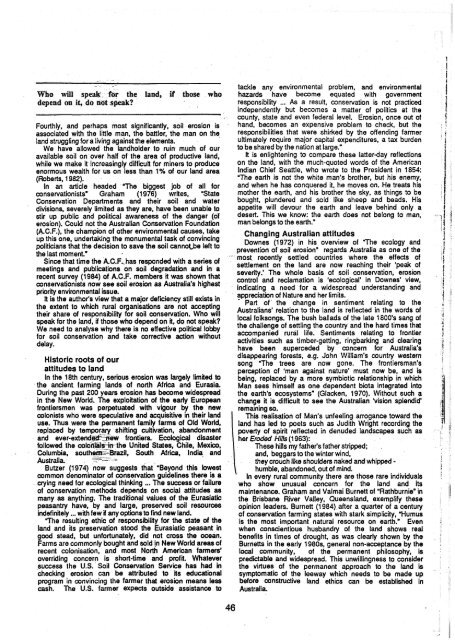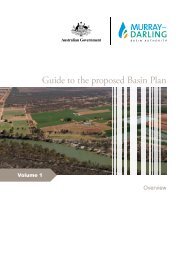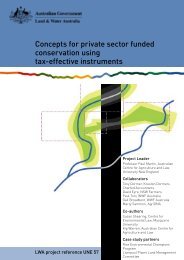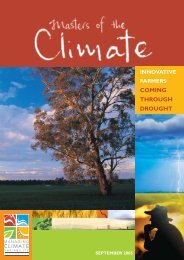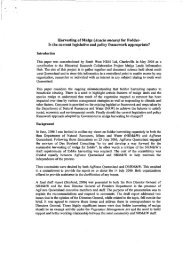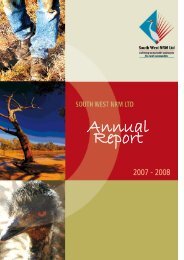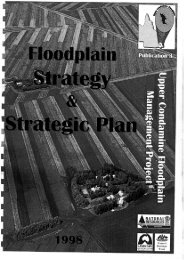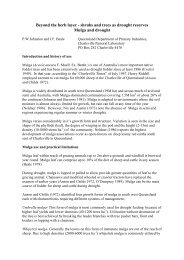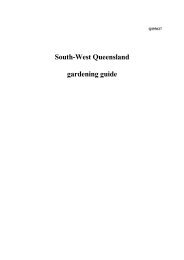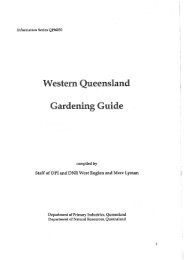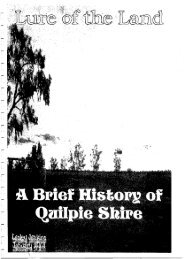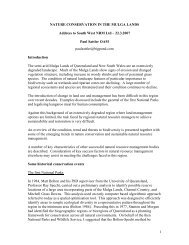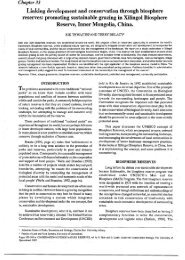soil-conservation-people-religion-and-land.pdf - South West NRM
soil-conservation-people-religion-and-land.pdf - South West NRM
soil-conservation-people-religion-and-land.pdf - South West NRM
You also want an ePaper? Increase the reach of your titles
YUMPU automatically turns print PDFs into web optimized ePapers that Google loves.
Who will speali.:%r the l<strong>and</strong>, if those who<br />
depend on it, do not speak?<br />
Fourthly, <strong>and</strong> perhaps most significantly, <strong>soil</strong> erosion is<br />
associated with the little man, the battler, the man on the<br />
l<strong>and</strong> struggling for a living against the elements.<br />
We have allowed the l<strong>and</strong>holder to ruin much of our<br />
available <strong>soil</strong> on over half of the area of productive l<strong>and</strong>,<br />
while we make it increasingly difficult for miners to produce<br />
enormous weatth for us on less than 1% of our l<strong>and</strong> area<br />
(Roberts, 1982).<br />
In an article headed 'The biggest job of all for<br />
<strong>conservation</strong>ists" Graham (1976) writes, "State<br />
Conservation Departments <strong>and</strong> their <strong>soil</strong> <strong>and</strong> water<br />
divisions, severely limited as they are, have been unable to<br />
stir up public <strong>and</strong> political awareness of the danger (of<br />
erosion). Could not the Australian Conservation Foundation<br />
(A.c.F.), the champion of other environmental causes, take<br />
up this one, undertaking the monumental task of convincing<br />
politicians that the decision to save the <strong>soil</strong> cannooe left to<br />
the last moment.'<br />
Since that time the A.C.Fl has responded with a series of<br />
meetings <strong>and</strong> publications on <strong>soil</strong> degradation <strong>and</strong> in a<br />
recent survey (1984) of A.C.F. members it was shown that<br />
<strong>conservation</strong>ists now see <strong>soil</strong> erosion as Australia's highest<br />
priorii environmental issue.<br />
It is the author's view that a major deficiency still exists in<br />
the extent to which rural organisations are not accepting<br />
their share of responsibility for <strong>soil</strong> <strong>conservation</strong>. Who will<br />
speak for the l<strong>and</strong>, if those who depend on it, do not speak?<br />
We need to analyse why there is no effective political lobby<br />
for <strong>soil</strong> <strong>conservation</strong> <strong>and</strong> take corrective action without<br />
delay.<br />
Historic roots of our<br />
attitudes to l<strong>and</strong><br />
In the 18th century, serious erosion was largely limited to<br />
-the ancient farming l<strong>and</strong>s of north Africa <strong>and</strong> Eurasia.<br />
During the past 200 years erosion has become widespread<br />
in the New World. The exploitation of the early European<br />
frontiersmen was perpetuated with vigour by the new<br />
colonists who were speculative <strong>and</strong> acquisitive in their l<strong>and</strong><br />
use. Thus were the permanent family farms of Old World,<br />
replaced by temporary shifting cuttivation, ab<strong>and</strong>onment<br />
<strong>and</strong> ever-extend:&* frontiers. Ecological disaster<br />
followed the coloiiiia-ithe United States, Chile, Mexico,<br />
Columbia, ~outh~fiazil, --<br />
-<br />
<strong>South</strong> Africa, India <strong>and</strong><br />
Australia.<br />
- --<br />
-- -<br />
Butzer (1974) now suggests that 'Beyond this lowest<br />
common denominator of <strong>conservation</strong> guidelines there is a<br />
crying need for ecological thinking ... The success or failure<br />
of <strong>conservation</strong> methods depends on social attitudes as<br />
many as anything. The traditional values of the Eurasiatic<br />
peasantry have, by <strong>and</strong> large, preserved <strong>soil</strong> resources<br />
indefinitely ... with few if any options to find new l<strong>and</strong>.<br />
"The resulting ethic of responsibility for the state of the<br />
l<strong>and</strong> <strong>and</strong> its preservation stood the Eurasiatic peasant in<br />
good stead, but unfortunately, did not cross the ocean.<br />
Farms are commonly bought <strong>and</strong> sold in New World areas of<br />
recent colonisation, <strong>and</strong> most North American farmers'<br />
overriding concern is short-time <strong>and</strong> profit. Whatever<br />
success the U.S. Soil Conservation Service has had in<br />
checking erosion can be attributed to its educational<br />
program in convincing the farmer that erosion means less<br />
cash. The U.S. farmer expects outside assistance to<br />
tackle any environmental problem, <strong>and</strong> environmental<br />
hazards have become equated with government<br />
responsibility ... As a result, <strong>conservation</strong> is not practiced<br />
independently but becomes a matter of politics at the<br />
county, state <strong>and</strong> even federal level. Erosion, once out of<br />
h<strong>and</strong>, becomes an expensive problem to check, but the<br />
responsibilities that were shirked by the offending farmer<br />
ultimately require major capital expenditures, a tax burden<br />
to be shared by the nation at large."<br />
It is enlightening to compare these latterday reflections<br />
on the l<strong>and</strong>, with the much-quoted words of the American<br />
Indian Chief Seattle, who wrote to the President in 1854:<br />
'The earth is not the white man's brother, but his enemy,<br />
<strong>and</strong> when he has conquered it, he moves on. He treats his<br />
mother the earth, <strong>and</strong> his brother the sky, as things to be<br />
bought, plundered <strong>and</strong> sold like sheep <strong>and</strong> beads. His<br />
appetite will devour the earth <strong>and</strong> leave behind only a<br />
desert. This we know: the earth does not belong to man,<br />
man belongs to the earth."<br />
Changing Australian attitudes<br />
Downes (1972) in his overview of 'The ecology <strong>and</strong><br />
prevention of <strong>soil</strong> erosionn regards Australia as one of the<br />
most recently settled countries where the effects of<br />
settlement on the l<strong>and</strong> are now reaching their 'peak of<br />
severity.' The whole basis of <strong>soil</strong> <strong>conservation</strong>, erosion<br />
control <strong>and</strong> reclamation is 'ecological' in Downes' view,<br />
indicating a need for a widespread underst<strong>and</strong>ing <strong>and</strong><br />
appreciation of Nature <strong>and</strong> her limits.<br />
Part of the change in sentiment relating to the<br />
Australians' relation to the l<strong>and</strong> is reflected in the words of<br />
local folksongs. The bush ballads of the late 1800's sang of<br />
the challenge of settling the country <strong>and</strong> the hard times that<br />
accompanied rural life, Sentiments relating to frontier<br />
activities such as timber-getting, ringbarking <strong>and</strong> clearing<br />
have been superceded by concern for Australia's<br />
disappearing forests, e.g. John William's country western<br />
song "The trees are now gone. The frontiersman's<br />
perception of 'man against nature' must now be, <strong>and</strong> is<br />
being, replaced by a more symbiotic relationship in which<br />
Man sees himself as one dependent biota integrated into<br />
the earth's ecosystemsw (Glacken, 1970). Without such a<br />
change it is difficult to see the Australian 'vision splendid'<br />
remaining so.<br />
This realisation of Man's unfeeling arrogance toward the<br />
l<strong>and</strong> has led to poets such as Judith Wright recording the<br />
poverty of spirit reflected in denuded l<strong>and</strong>scapes such as<br />
her Eroded Hills (1963):<br />
These hills my father's father stripped;<br />
<strong>and</strong>, beggars to the winter wind,<br />
they crouch like shoulders nakd <strong>and</strong> whipped -<br />
humble, ab<strong>and</strong>oned, out of mind.<br />
In every rural community there are those rare individuals<br />
who show unusual concern for the l<strong>and</strong> <strong>and</strong> its<br />
maintenance. Graham <strong>and</strong> Valmai Burnett of "Rathburnie" in<br />
the Brisbane River Valley, Queensl<strong>and</strong>, exemplify these<br />
opinion leaders. Burnett (1984).after a quarter of a century<br />
of <strong>conservation</strong> farming states with stark simplicity, 'Humus<br />
is the most important natural resource on earth." Even<br />
when conscientious husb<strong>and</strong>ry of the l<strong>and</strong> shows real<br />
benefits in times of drought, as was clearly shown by the<br />
Burnetts in the early 1980s, general non-acceptance by the<br />
local community, of the permanent philosophy, is<br />
predictable <strong>and</strong> widespread. This unwillingness to consider<br />
the virtues of the permanent approach to the l<strong>and</strong> is<br />
symptomatic of the leeway which needs to be made up<br />
before constructive l<strong>and</strong> ethics can be established in<br />
Australia


